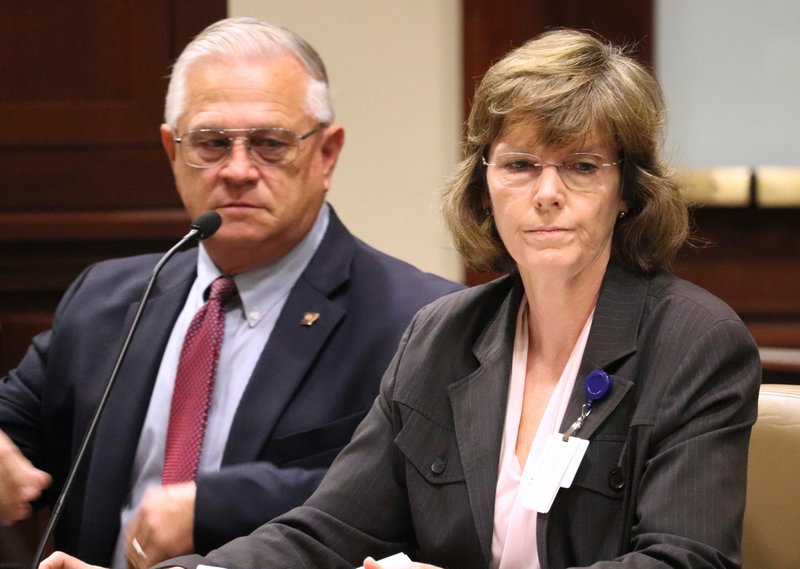Arkansas' prison officials are not preparing to carry out any executions before year's end, stymied by a dwindling supply of lethal injection drugs and no way to keep secret the manufacturers of future batches, a prison spokesman said Wednesday.
Only one prisoner on death row, Don Davis, is currently eligible for execution, but the Department of Correction lacks one of three drugs needed to carry out lethal injections.
The search for that drug, vecuronium bromide, ended in March, prisons spokesman Solomon Graves said, after the Arkansas Supreme Court ruled that the state can no longer keep secret documents identifying the manufacturers of the state's execution drugs.
Little Rock TV station KARK first reported the halt in the drug search.
"We are not actively looking for additional drug supplies at this time," Graves said Wednesday, confirming the TV station's report.
Graves added that the Department of Correction has no plans to resume its search until lawmakers change the state's Method of Execution Act to make manufacturers exempt from disclosure under the state's public records law. Such a change in the law is unlikely to come before the Legislature meets in general session in January.
By then the state's two remaining supplies of execution drugs -- midazolam, a sedative, and potassium chloride, the heart-stopping third drug -- will have expired.
The decision to end the search for drugs was made within the Department of Correction, Graves said. Gov. Asa Hutchinson is supportive of the decision, a spokesman said.
Hutchinson and Department of Correction officials have called for a change in the law that would allow the state to keep secret the names of the companies that make the drugs used in executions. The Board of Corrections, however, has yet to endorse the legislation.
The issue "stems from the fact that they just can't get any" drugs, Hutchinson spokesman J.R. Davis said.
Many pharmaceutical manufacturers are opposed to their products being used in executions, which has led to several hiccups as Arkansas has attempted to acquire drugs in spite of company objections.
Arkansas forfeited one batch of lethal injection drugs to U.S. Department of Drug Enforcement agents in 2011 after prisoners accused the Department of Correction of improperly importing barbiturates from a company based in the back of a driving school in West London.
Last year, as the state resumed executions for the first time in a decade, several companies stepped forward to say the state had violated policies put in place to ensure their products were not used in executions. One company, the medical distributor McKesson, unsuccessfully filed suit to get its drugs back.
"It's not about protecting [the state's] sources, it's about preventing the sources of its drugs from knowing their products are being improperly obtained and used," said Robert Dunham, executive director of the Death Penalty Information Center.
Arkansas' Method of Execution Act already allows the state to withhold documents that could be used to identify the persons or businesses that actually sell lethal injection drugs to the state. However manufacturers and large-scale distributors like McKesson can trace products and put pressure on smaller businesses that are found to have sold drugs for lethal injections.
Dunham said manufacturers also have threatened to stop selling to state governments altogether if products continue to wind up in the hands of executioners.
Graves said the state was unable to find a willing supplier of vecuronium bromide after the state's batch expired at the beginning of March. The state Supreme Court handed down its ruling on secrecy at the end of that month.
"We had been told by potential suppliers that they were concerned with the identification of manufacturers," Graves said.
Faced with a national shortage of available execution drugs, some states have looked at other ways of carrying out executions.
Last week, Nevada planned to become the first state to use fentanyl, a powerful opiate, as part of a lethal injection. The execution was called off, however, after a pharmaceutical company objected to the use of one of its products being used in addition to the fentanyl.
Oklahoma has said it will attempt a first-of-its-kind "hypoxia" execution using nitrogen gas, a method that Arkansas lawmakers have proposed using in the past.
Changing the state's method of execution also will require action by lawmakers, though neither Hutchinson nor the Department of Correction have said they are ready to take such a step.
Arkansas' current three-drug protocol has been upheld by the courts, officials note.
"I think if you open it up to a new method, it just gets tied up in courts for years and years," Davis said.
Arkansas went more than 10 years without an execution before Hutchinson scheduled eight men to die over a two-week period in April of last year. The rapid pace of the planned executions -- unprecedented since the United States resumed using the death penalty in 1977 -- drew international attention and a flurry of lawsuits for Little Rock and the Cummins Unit, the location of the state's death chamber.
Courts ultimately halted four of the executions, while another four were carried out. Of the four who received reprieves, only Davis, a 55-year-old convicted murderer, has had his stay lifted.
Davis attempted suicide last week, the department said, and was returned to the Varner Unit on Tuesday after recovering at a separate medical unit. There are 28 other men on Arkansas' death row at the Varner prison.
A Section on 07/19/2018
